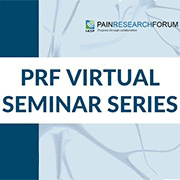Editor’s note: This seminar is the latest event in a series of seminars launched in May 2020 to help keep the pain research community connected during the COVID-19 pandemic and to provide all members of our community with virtual educational opportunities. The seminar series is supported by the Center for Advanced Pain Studies at the University of Texas at Dallas, US.

The IASP Pain Research Forum hosted a seminar with Pang-Yen Tseng, PhD, NIDCR, NIH, Bethesda, US, and Fang Wang, MD, PhD, Washington University School of Medicine, St. Louis, US, on Tuesday, January 12, 2021, noon-1:15 p.m. Eastern Standard Time (US)/5-6:15 p.m. GMT/6-7:15 p.m. CET. A Q&A session moderated by Sarah Ross, PhD, University of Pittsburgh, US, followed the presentation.
A recording of the seminar is now available in the IASP Pain Education Resource Center (PERC) here.
Here are abstracts from the presenters:
Peripheral Sensitization in Chronic Pruritus (Pang-Yen Tseng)
Chronic itch is a major symptom of many inflammatory skin diseases. This type of pruritus is thought to be facilitated by cytokines that activate cutaneous nerve fibers; however, the molecular components and mechanisms involved are poorly understood. We found that itch-selective sensory neurons highly express the oncostatin M (OSM) receptor (OSMR). By analyzing RNA sequencing data from human skin biopsies, we found that OSM is commonly upregulated in psoriasis, atopic dermatitis, and cutaneous T cell lymphoma, which are all diseases associated with chronic itch. Single-cell sequencing analysis showed that OSM is mainly produced by cutaneous T cells. Unlike canonical pruritogens such as histamine or chloroquine, OSM sensitizes neurons by potentiating neural responses to pruritogens and by enhancing neural excitability, leading to exaggerated itch. Sensory neuron-specific OSMR knockout greatly mitigated the itch phenotype and skin inflammation in a psoriasiform dermatitis mouse model. Pharmacologically, antagonizing the OSMR complex effectively alleviated inflammatory skin pruritus. Together our results reveal OSM as a novel itch neuromodulator and suggest that antagonizing OSM signal transduction could be a novel antipruritic strategy.
A Basophil-Neuronal Axis Promotes Itch (Fang Wang)
Atopic dermatitis (AD) is a chronic and relapsing inflammatory skin disorder associated with severe itch. In addition to chronic itch, patients often experience intense acute itch exacerbations. Recent seminal discoveries have unearthed the neuroimmune circuitry of itch, leading to the development of novel treatments. However, mechanisms underlying acute itch exacerbations remain overlooked. Moreover, although IgE reactivity to various allergens is a well-known feature of AD, its precise role in AD pathogenesis remains unclear. By reviewing a large cohort of patients with moderate to severe AD in clinical trials, we found that patients harboring allergen-specific IgE are prone to develop acute itch flares. Further, to explore the role of IgE in AD-related itch, we employed a murine model in which allergen-specific IgE was generated in the setting of AD-like disease to evoke allergen-induced acute itch flares. Classically, the mast cell-histamine axis has been recognized as the canonical itch paradigm triggered by IgE. Strikingly, although IgE-mediated acute itch was dependent on the mast cell-histamine axis in steady state, in the setting of AD-like inflammation mast cells and histamine were dispensable. Instead, we demonstrate that chemogenetic activation of circulating basophils was sufficient to evoke acute itch behavior in animals. Further, we found that acute itch flares were alleviated by basophil depletion and interruption of leukotriene C4 signaling in AD-like inflammation. Collectively, these findings reveal a previously unrecognized contribution of the IgE-basophil-leukotriene pathway in mediating acute itch, which may explain why mast cell- and histamine-targeted therapies have demonstrated poor anti-itch efficacy in AD.
About the presenters
Pang-Yen Tseng, PhD, received his PhD in comparative pathology at the University of California, Davis, and is now a postdoctoral fellow at NIDCR, National Institutes of Health. His current research interest is the molecular mechanisms underlying chronic itch and pain. In his postdoctoral training at NIH, he uses next-generation sequencing and single-cell sequencing to discover novel molecules involved in inflammatory pruritus. He then uses calcium imaging, cellular electrophysiology, and transgenic mouse models to characterize the functions of novel itch mediators.
Fang Wang, MD, PhD, received her MD degree from Fudan University in China and, in 2017, received her PhD degree from Sun Yat-sen University. She works as a physician-scientist in dermatology in China, where she has done research on the cytokine profile during cutaneous adverse drug reactions. She joined Brian Kim’s lab at Washington University in 2017 where she began to focus on neuroimmunology research. During the past three years, she has studied the role of basophils in itch biology and found that in the context of atopic dermatitis, basophils are required for IgE-mediated acute itch. Now she is back in China, where she remains active in the itch and neuroimmunology research field.
About the moderator
Sarah Ross, PhD, is associate professor of Neurobiology and Anesthesiology at the University of Pittsburgh, US. The spinal cord plays a critical role in processing somatosensory information, including touch, temperature, pain, and itch, and Dr. Ross’ lab is interested in characterizing these spinal microcircuits. To do so, her research team uses a combination of approaches. These include generating novel genetic tools to study populations of spinal neurons; performing axon circuit mapping using viruses; elucidating neural coding using optogenetics and electrophysiology; and studying sensory behavior using chemogenetic approaches.
Join the conversation about the seminar on Twitter @PainResForum #PRFSeminar
We thank the Center for Advanced Pain Studies at the University of Texas at Dallas, US, for its support of the PRF seminar series.



